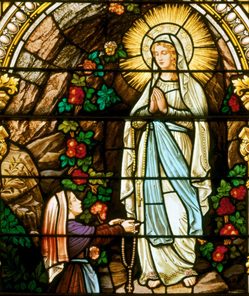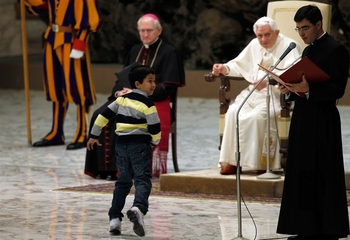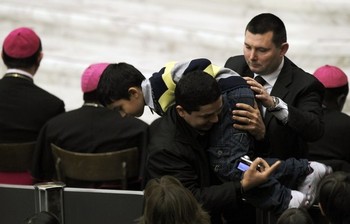Pope Benedict XVI: February 2011 Archives
Released earlier today, the Pope gave the Church his thinking and hopes for the living and the promotion of vocations. Very clear is the Pope's insistence on one's being familiar with the Scriptures, friendship with the Lord cultivated through personal and liturgical prayer. Also, one's own self-awareness factors into the discernment of one's vocation, whether to religious life, priesthood or to the lay state. May the Lord of the Harvest grant an increase.
The 48th World Day of Prayer for Vocations, to be celebrated on 15 May 2011, the Fourth Sunday of Easter, invites us to reflect on the theme: "Proposing Vocations in the Local Church". Seventy years ago, Venerable Pius XII established the Pontifical Work of Priestly Vocations. Similar bodies, led by priests and members of the lay faithful, were subsequently established by Bishops in many dioceses as a response to the call of the Good Shepherd who, "when he saw the crowds, had compassion on them, because they were like sheep without a shepherd", and went on to say: "The harvest is plentiful but the labourers are few. Pray therefore the Lord of the harvest to send out labourers into his harvest!" (Mt 9:36-38).
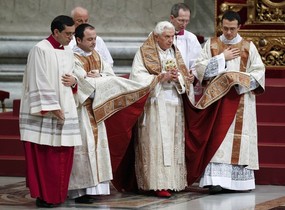 Word's been received that Pope Benedict's organ donor card is void. It's been so since his election to the papacy in 2005. Since the 1970's it is said that he's been an organ donor.
Word's been received that Pope Benedict's organ donor card is void. It's been so since his election to the papacy in 2005. Since the 1970's it is said that he's been an organ donor.The act of love, which is expressed with the gift of one's own vital organs, is a genuine testament of charity that knows how to look beyond death so that life always wins. The recipient should be aware of the value of this gesture that one receives, of a gift that goes beyond the therapeutic benefit. What they receive is a testament of love, and it should give rise to a response equally generous, and in this way grows the culture of gift and gratitude.
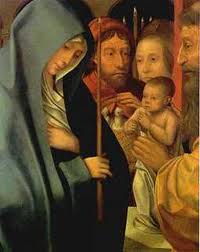
In today's feast we contemplate the Lord Jesus whom Mary and Joseph take to the Temple "to present him to the Lord" (Luke 2:22). Revealed in this evangelical scene is the mystery of the Son of the Virgin, the consecrated One of the Father, who came into the world to carry out his will faithfully (cf. Hebrews 10:5-7).
Simeon points to him as "light for revelation to the Gentiles" (Luke 2:32), and proclaims with prophetic word his supreme offer to God and his final victory (cf. Luke 2:32-35). It is the meeting of the two Testaments, the Old and the New. Jesus enters the ancient Temple, He who is the new Temple of God: He comes to visit his people, bringing to fulfillment obedience to the Law and inaugurating the end times of salvation.
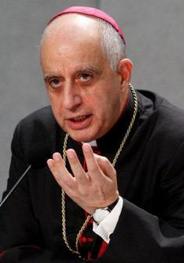 In some comments made of a book on the papacy of Benedict XVI, Archbishop Rino Fisichella said that at the beginning of every pontificate the new pope and the Church face certain challenges that are normal. As Fisichella, the head of the Pontifical Council for Promoting New Evangelization reminded his audience, we're only 6 years into Benedict's ministry as the head of the Catholic Church. None of the things that blotted the pope's copybook (that is, have caused the Pope to expend political capitol) are new and that extraordinary; change is always needed in the Church moving to a new administration. All of the recent popes have had to deal the growing pains of transitioning from pontificate to another. In Fisichella's interpretation, and I concur, the central issue of Benedict's work is one of formation, a new education in the faith of all the faithful, including the higher and lower clergy. However, I do think that some of the people that work directly or indirectly at the Holy See have not been as helpful as they possibly could be so as not to have Benedict kicked by the secular media at every "major" event.
In some comments made of a book on the papacy of Benedict XVI, Archbishop Rino Fisichella said that at the beginning of every pontificate the new pope and the Church face certain challenges that are normal. As Fisichella, the head of the Pontifical Council for Promoting New Evangelization reminded his audience, we're only 6 years into Benedict's ministry as the head of the Catholic Church. None of the things that blotted the pope's copybook (that is, have caused the Pope to expend political capitol) are new and that extraordinary; change is always needed in the Church moving to a new administration. All of the recent popes have had to deal the growing pains of transitioning from pontificate to another. In Fisichella's interpretation, and I concur, the central issue of Benedict's work is one of formation, a new education in the faith of all the faithful, including the higher and lower clergy. However, I do think that some of the people that work directly or indirectly at the Holy See have not been as helpful as they possibly could be so as not to have Benedict kicked by the secular media at every "major" event.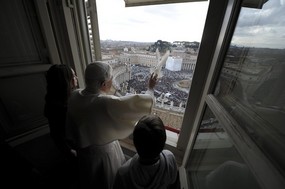 The general intention
The general intention